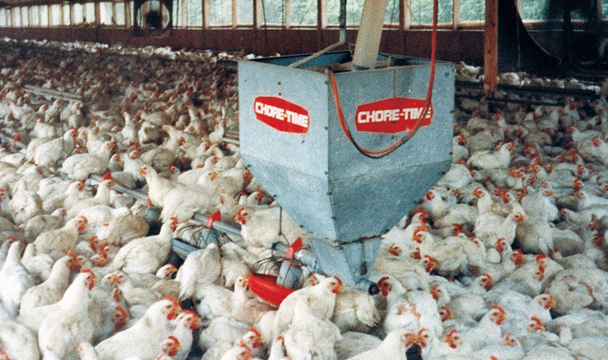American chickens are fed a steady diet of tetracycline and other antibiotics, not to keep them from getting sick, but simply because the treatment makes healthy birds grow faster. The downside is that some bacteria mutate and develop resistance to drugs that once would have destroyed them. These drug-resistant “superbugs” can sicken and even kill people who eat undercooked meat.
Now, researchers have discovered another way that these virtually indestructible germs can spread. A study published by a Johns Hopkins University research team in the December issue of the journal Environmental Health Perspectives shows that workers in poultry slaughterhouses are 32 times more likely than the rest of the population to carry drug-resistant E. coli bacteria in their intestines. Apparently, just working around infected birds was enough to pass the bacteria on to the employees, and they, in turn, could spread the germs to the population at large.
The scientists’ disturbing conclusion: Poultry workers may be “an important route of entry for antimicrobial-resistant E. coli into the community.”
There is a simple way to prevent this problem. Follow the European Union’s example and ban the use of antibiotics for growth promotion.
Keeping Them Honest
I once stood on a dirt road in California’s Salinas Valley. On the right side, organic cauliflower stretched to the horizon, row upon parallel row. On the other side was a similar spread of non-organic cauliflower. I could see no way to determine the difference between the two. It got me thinking, can regulators tell one from the other?
The truth is that they can’t. But that may change. In a study published last month in the Journal of Environmental Quality, a group of Spanish scientists led by Francisco del Amor reported that they had discovered a way to analyze the concentration of nitrogen isotopes in an experimental crop of sweet peppers to determine whether they were grown with natural animal manure or chemical fertilizer.
Sounds like that’s just another way of saying that there’s more to organic than meets the eye.
The Spam Index
Since abandoning her day job for freelancing, my colleague Nanette Maxim has become a keen follower of the stock market. It appears she may have stumbled across an indicator that has escaped Wall Street financiers.
Last Friday, as recessionary fears led to another down day for the battered Dow Jones Industrial Average, shares of Hormel Foods Corp. surged more than six percent, driven by increased sales of the company’s signature processed pork product: SPAM. Chief Executive Jeffrey Ettinger told Reuters that it’s clear that there’s a slowdown in the economy, and that SPAM can appeal to budget-conscious consumers.
It’s understandable that big-time stock analysts overlooked this trend. The last time I checked, the popular Hormel brand was not listed on the menus of the Manhattan steakhouses they frequent for their expense account entertaining.
I’ll leave it to you to draw your own conclusions about the dietary habits of freelance writers.




 Pinterest
Pinterest


